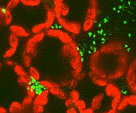Plant Pathology, Department of

Department of Plant Pathology: Faculty Publications
Document Type
Article
Date of this Version
2012
Citation
Plant Disease Management Reports 6, FC078 (2012).
Abstract
A foliar fungicide efficacy timing trial was conducted at the University of Nebraska-Lincoln South Central Agricultural Laboratory near Clay Center, NE. DeKalb corn hybrid DKC 62-54, rating of “good” (6 out of 9) for gray leaf spot (GLS) and “excellent” (2 out of 9) for common rust (CR), was planted on 3 May in 30 in. rows with a target population of 32,000 plants/A. The trial area was disked with a crop history of seven years of continuous corn. On 9 May before plant emergence, a herbicide program of Roundup (1 pt/A), Verdict (16 fl oz/A) and Atrazine (1 lb/A) was applied to the site. Twelve treatments and a nontreated control were replicated six times in a randomized complete block design. . . . There were no statistical differences between treatments for lodging as the nontreated control had a higher percentage of lodged corn plants compared to all but one foliar fungicide treatment. Among all treatments, the nontreated control had the lowest stay green percentage (23.7%) while Priaxor, 4 fl oz/A at VT/R1+31d had the highest percentage (31.1%). There were no significant differences among treatments for 500-count kernel weights. There were no statistical differences in grain moisture or yield among all treatments. Grain moisture ranged from 15.0% to 15.3%. Priaxor, 4 fl oz/A at VT/R1+16d was the highest yielding treatment with 241.7 bu/A.


Comments
Copyright © 2012 The American Phytopathological Society. Used by permission.